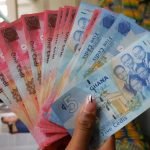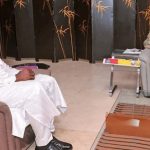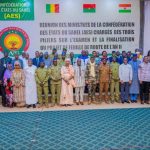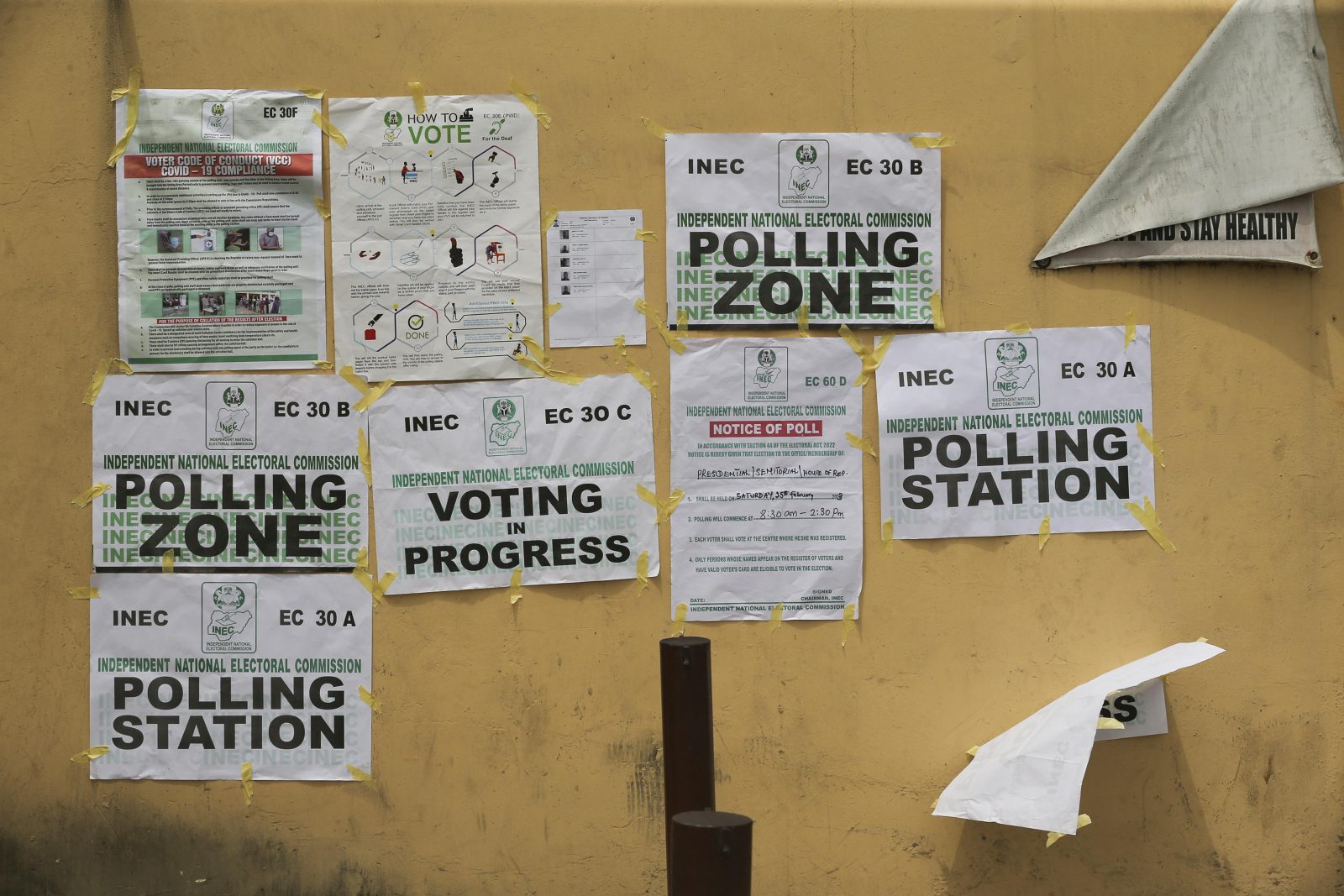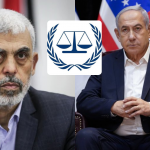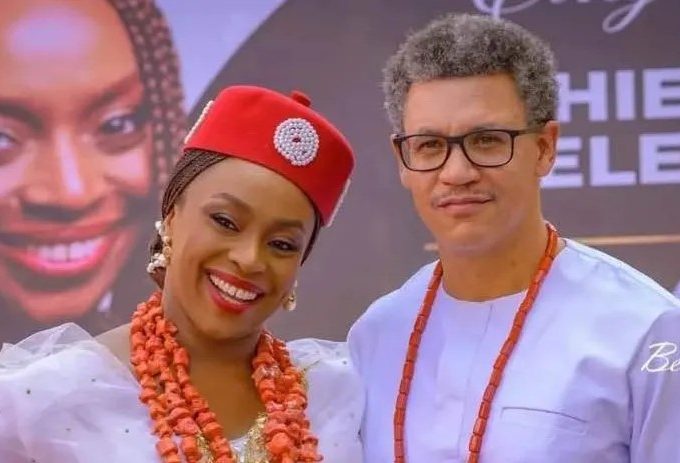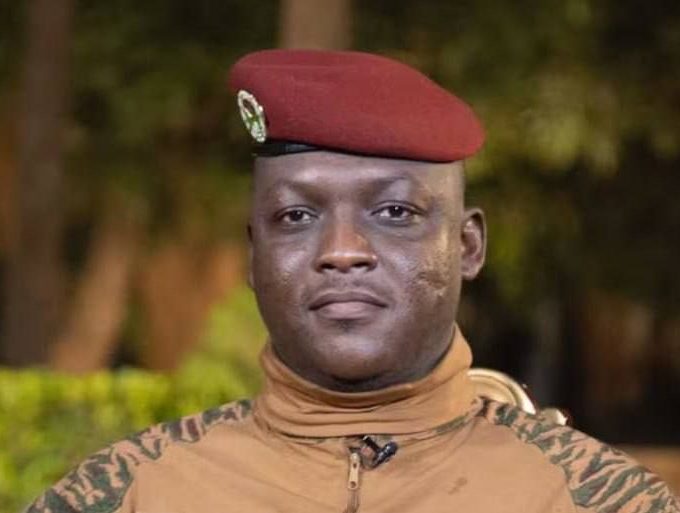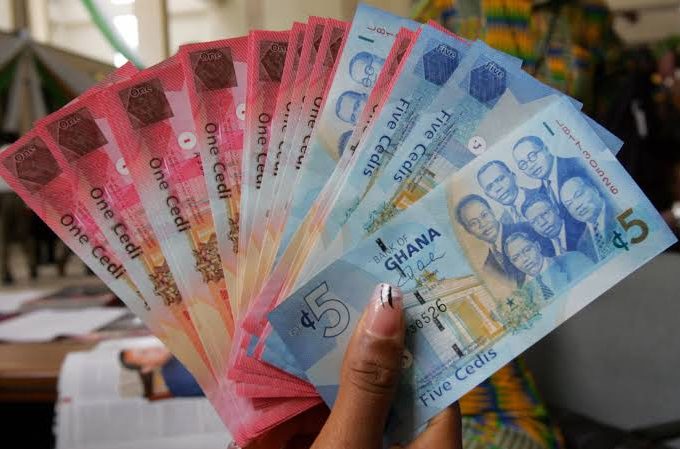
Many Nigerians yearn for the opportunity to participate in a peaceful voting process, one where they can exercise their rights to vote for leaders of their choice and witness the establishment of a national government that represents their rights, desires and aspirations. Indeed, a 2023 pre-election survey by Afrobarometer, a pan-African research network, found that 70 per cent of respondents in Nigeria said they want democracy. But little more than 1 in 4 registered voters in the country exercised their right to vote in last year’s presidential election. This examination of the presence and role of false information before, during and after the contest is the first in a series of stories that raises pointed questions about the election’s legitimacy, as well as the current status and future trajectory of democracy in Africa’s most populous nation.
On February 11, 2023, 14 days before Nigeria’s presidential election, former aviation minister Femi Fani-Kayode wrote a tweet that appeared to question whether the country was about to experience another coup d’etat attempt.
Peoples Democratic Party (PDP) presidential candidate Atiku Abubakar was reportedly holding a secret meeting with army generals to topple the government, he wrote.
“Why would a presidential candidate have secret meetings with soldiers 14 days before the election?” the post thread read. “Is this meeting part of the wider agenda to disrupt the elections, destabilise the country, set us on fire, incite chaos and violence, provoke a coup d’etat…?”
Fani-Kayode, then the director of special media projects and new media of the Campaign Council of the All Progressives Congress (APC), Nigeria’s ruling party, had at least 1.2 million social media followers at the time of the election.
Several days later, the State Security Service interrogated Fani-Kayode for five hours. After a 14-tweet thread asserting that he had done “nothing wrong” in referencing Nigeria’s bloody history and tortuous road to democracy, Fani-Kayode expressed regret and explained that he failed to verify the news source, according to Premium Times. It was a temporary retreat.
Fani-Kayode later made other statements the Centre for Collaborative Investigative Journalism (CCIJ) found to be misleading. For example, on April 12, 2023, he claimed that Labour Party presidential candidate Peter Obi had been deported to Nigeria by British authorities. (Labour Party Campaign Council spokesperson Diran Onifade said that Obi was detained and questioned in an impersonation crime involving his name. Daily Trust newspaper also debunked the claim that Obi was deported.)
However, this is not the story of one powerful former government official. It’s an investigation into the hard-to-quantify but nonetheless real and negative impact of a multi-front assault on the truth before and after last year’s Nigerian presidential election.
Party spokespeople, journalists and social media influencers helped generate false information that received millions of views during that time, according to an analysis by CCIJ. From implying the presence of an unsubstantiated coup plot to spreading false election results to fomenting ethnic discord, some of these posts remain on the authors’ social media pages more than a year after they were made and at the time of this publication.
CCIJ reviewed numerous reports of election misinformation from spokespersons, news outlets and social media influencers. Those who spread false information faced minimal consequences from either the social media platforms or the Nigerian government. The Independent National Electoral Commission (INEC) sent a letter dated May 15, 2024, in which it said it was working on answers to a detailed list of questions CCIJ had submitted in April. It had not provided answers by the time of this publication. The social media platforms declined to comment for this article.
At the time of this publication, CCIJ had not found any publicly available records of anyone penalised for spreading false information during the election, despite the existence of laws such as the Cybercrimes Act, 2015 and codes forbidding the publication of false news with the intent of causing fear. Instead, the very laws established to deter the spread of misleading information have been used against some of the journalists, bloggers and other citizens who exposed fake news.
INEC did not respond to detailed questions from CCIJ about how it grappled with electoral misinformation. In a more than 500-page report published in February 2024, it wrote that its “proactive and regular dissemination about its policies and activities through the mainstream media, social media platforms and online newspaper (inecnews.com) countered fake narratives as much as possible.”
Others held different views.
CCIJ conducted an online survey of Nigerian citizens that it distributed through some of the newsrooms in its network. It sought in part to gauge participants’ awareness of false information online and INEC’s efforts to combat it during last year’s campaign season. Close to two-thirds of the 104 respondents said they were unaware of INEC’s efforts, while only seven people said they were aware. None of the 36 who explicitly answered the question said INEC’s actions to counter misinformation were effective.
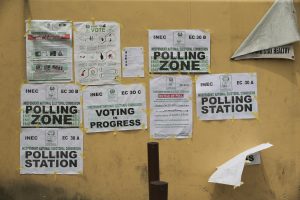
[Suggested]: PULL QUOTE: None of the 36 respondents who answered a CCIJ survey question about INEC’s efforts to counter misinformation said they were effective. Photograph by Akintunde Akinleye / CCIJ
Civil society activist Armsfree Ajanaku said in an interview with CCIJ that false and misleading information widely shared on social media may have contributed to the low turnout in the election.
In 2003, 69% of eligible Nigerians participated in the nationwide elections. Two decades later, despite a pre-election report from Afrobarometer that found a large majority of Nigerians want their country to be a democracy, the rate of eligible voter participation had fallen to 27%.
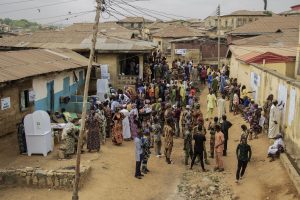
[Suggested] A 2023 pre-election survey by Afrobarometer, a pan-African research network, found that 70 per cent of respondents in Nigeria said they want democracy. However, little more than 1 in 4 registered voters in the country exercised their right to vote. Photograph by Ayo Adams / CCIJ
A record low in the country since democracy was restored in 1999, this was the sixth-lowest voter turnout rate when compared to more than 1,000 presidential elections worldwide since the end of World War II, according to a CCIJ analysis of elections data compiled by the International Institute for Democracy and Electoral Assistance.
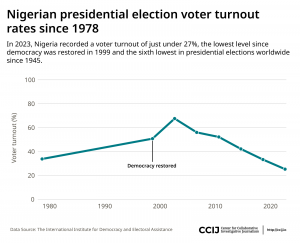
Title: Nigerian presidential election voter turnout rates since 1978
Subtitle: In 2023, Nigeria recorded a voter turnout of just under 27%, the lowest level since democracy was restored in 1999 and the sixth lowest in presidential elections worldwide since 1945.
Credit/Source: Data Source: The International Institute for Democracy and Electoral Assistance
Idayat Hassan, former executive director at the Centre for Democracy and Development and current senior associate at the Centre for Strategic and International Studies (CSIS), said the spread of false information during the 2023 election increased polarisation and social unrest while undermining the election’s legitimacy and the country’s fragile unity.
“Political actors, influencers and news websites often have strategic interests and can use disinformation as a tool to achieve political or financial gains,” she said. “In some cases, they may underestimate the broader consequences of their actions, but in others, the spread of disinformation is a calculated move to influence public opinion or disrupt the political process.”
SPOKESPEOPLE COMPOUND CONFUSION
The 2023 election was not the first time the Nigerian public encountered false information. In 2018, The Guardian published an investigation detailing the contentious role of the now-defunct data analytic firm, Cambridge Analytica played in the 2015 Nigerian presidential election.
Opeyemi Kehinde, an editor at Abuja-based FactCheckHub, the fact-checking arm of the International Centre for Investigative Reporting (ICIR), said in an interview with CCIJ that the amount of false information rose in the 2023 general election compared with previous contests.
Former senator and PDP spokesperson Dino Melaye also posted false information to his 3.4 million followers on X. On March 6, 2023, he shared what appeared to be a screenshot of a news article suggesting that INEC Chairman Mahmood Yakubu declared that his life was “at risk.” The photo shared by Melaye did not contain any website attribution, and online searches failed to yield any credible reports corroborating the claim attributed to the INEC chairman. Rotimi Oyekanmi, chief press secretary and media adviser to Yakubu, also dismissed the false claim.
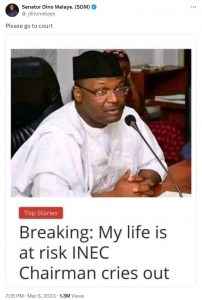
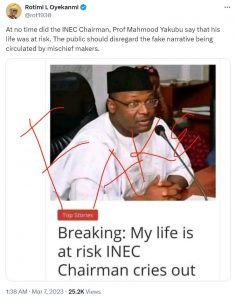
[Suggested] False Twitter claim by PDP spokesperson Dino Melaye dismissed by INEC Press Secretary Rotimi Oyekanmi.
Melaye’s claim that CCIJ investigated generated more than 1 million views. Some readers not only reshared the post but also agreed with the fake information.
“So, the obsolete INEC chairman didn’t think of his life before his actions on the 25th of February?” an X user wrote, referring to the presidential election date. “Let him face his troubles squarely as they come.”
Festus Keyamo, aviation minister and a Senior Advocate of Nigeria (SAN), stirred trouble on February 9, 2023. He shared a series of pictures with 1 million followers that he suggested were from APC presidential candidate Bola Tinubu’s campaign event in Sokoto state ahead of the election.
However, a Google reverse image search conducted by CCIJ found that one of the pictures was originally taken in 2021 during the Lollapalooza music festival in Chicago. The others were real photos taken during the campaign rally in Sokoto, northwest Nigeria. Keyamo’s false claim amassed 1.1 million views on X.
“It is going to be propaganda against propaganda, word for word; we will meet them everywhere because Asiwaju [another name for Tinubu] has a mandate he will defend, and we are prepared to defend that mandate,” he declared in March 2023, the month after the election.
Examples of Image Manipulations
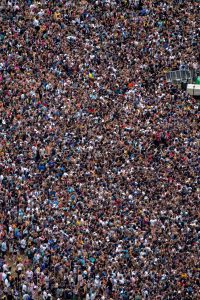
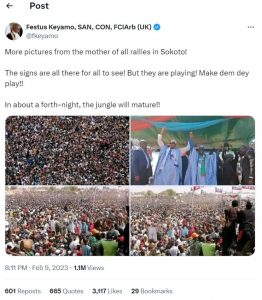
[Suggested] These two images show the tweet of Festus Keyamo and the original image from the Lollapalooza music festival in Chicago used in his false claim. Photo of Lollapalooza by Colin Hinkle.
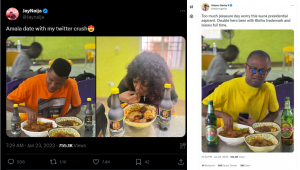
[SIDEBAR] Adamu Garba, a 2023 presidential aspirant and APC member, is another political figure who shared disinformation during the 2023 general election. Garba shared a claim on X on January 25, 2023 with his more than 158k followers that Peter Obi was drinking beer with a Biafra trademark. Accompanied by an image of Obi sitting with two bottles of Hero beer and dipping his hand inside a plate of food, his post as of the date of this publication had 762k views, 2.2k comments, 1.1k likes, and more than 640 retweets. The image appeared intended to depict Obi negatively to voters in the North, portraying not only consuming alcohol, which is forbidden in Islam but also associating him with Hero beer, which some have suggested is linked to the southeastern Biafra separatist movement. SABMiller, the company that produced the beer, said in a 2014 statement that there was no political motivation behind the brand. The investigation revealed that the image was doctored, with Obi’s head and neck appearing disproportionate to the rest of his body. A Google reverse image identified the original image as depicting a man who went on an Amala date with his girlfriend. Garba’s tweet misrepresented the situation by substituting Obi’s head for the man’s and altering the colour of the man’s clothing. Also, the two bottles in the image were energy drinks, and not Hero beer, as Garbu claimed.
NEWS OUTLETS ADD TO THE MISINFORMATION MIX
On August 14, 2022, the website Reportera compounded the false information flow, writing about PDP presidential candidate Abubakar’s troubles in an article headlined, “How Atiku stole $16bn power fund under Obasanjo’s watch.”
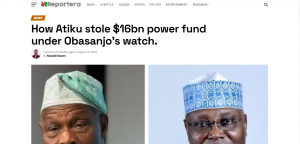
Four months later, the website published another report headlined, “Atiku Abubakar: The ‘Corrupt’ Customs Officer”.
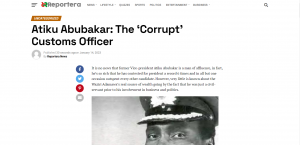
Both stories were published without sufficient proof. Reportera declined repeated requests for comment from CCIJ.
Apart from Reportera, CCIJ identified several other online platforms, such as Podium Reporters, Gist Digest, Prose Nigeria, blissnaijaa.blogspot.com, and Igbo Times Magazine – as well as Facebook pages from The Republican News and WiseReporters – that contributed to the spread of false information.
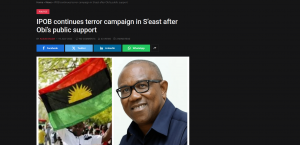


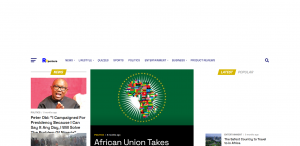
[Websites Montage] A collection of webpages from sites found to be publishing misleading information
Igbo Times Magazine falsely reported on February 26, 2023, that a Russian hacker had gained access to the INEC portal and leaked the official results, which showed Peter Obi winning. The figures in the article of 95 million votes between APC, PDP, and Labor Party exceeded by more than three times the total number of votes shared by INEC of nearly 25 million votes cast out of more than 93 million registered voters in Nigeria.
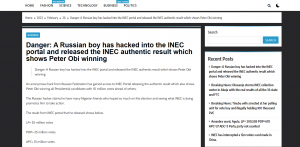
Igbo Times acknowledged it had published inaccurate reports during the election but insisted that it had removed them after being made aware of it.
Hillary Kelechi, who was listed as the administrative contact on Talkvendors.com, acknowledged developing blissnaijaa.blogspot.com and Gist Digest. Kelechi said he sold the websites but did not remember the identity of the buyers. He blocked and unblocked CCIJ and did not respond to additional questions about his link to the websites.
Republican News author Ike A. Offor, who also has done editing work, did not answer messages sent to his X and Facebook accounts. Prose Nigeria, WiseReporters and Podium Reporters also did not answer repeated requests for comment.
Idayat of CSIS said that there was a “proliferation of blogs funded or operated by political parties and their activists.” Some of the sites, like Podium Reporters, even produced partisan “fact checks” that favoured their candidate, further muddying the information waters, she said.
“These are made more believable by the fact that conventional media has been sharing video content and advertisements from candidates and parties that violate the Broadcast Code of Nigeria and the Peace Accord, signed by all the chairs of the 18 Nigerian political parties and their candidates, which prohibits the use of fake news, hate speech and promotes issue-based politics,” Idayat said.
COORDINATED INDIVIDUAL SOCIAL MEDIA EFFORTS
Social media influencers shared dubious content, too.
Using a cocktail of online tools, CCIJ identified five campaigns that appeared to be coordinated by X influencers @drpenking, @redcap_blondie, @firstladyship, @AreaFada1, @omoelerinjare and @VictorIsrael_. These six accounts had a combined total of close to 1 million X followers at the time of the election.
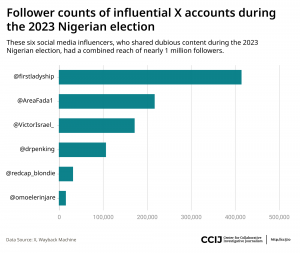
Title: Follower counts of influential X accounts during the 2023 Nigerian election
Subtitle: These six social media influencers, who shared dubious content during the 2023 Nigerian election, had a combined reach of nearly 1 million followers.
Credit/Source: Data Source: X, Wayback Machine
Along with multiple accounts on X and Facebook, these influencers declared false results for Obi with respect to Plateau and Anambra States, where Obi actually won, asserting that he received more than 1 million votes in each state.
An INEC collation officer said that there were 1.1 million votes cast in Plateau State and fewer than 1 million votes cast in Anambra State. The officer said Obi polled close to 600,000 votes in Anambra and more than 450,000 votes in Plateau State.
CCIJ’s effort to speak to these accounts’ owners proved unsuccessful. Only @drpenking and @redcap_blondie’s accounts were open to receiving messages. Requests for interviews and multiple messages sent to @drpenking were ignored and then blocked, while @redcap_blondie alleged that INEC manipulated the election results.
Nigerian musician Charles Oputa, popularly known as Charly Boy, used altered and modified videos and images to back Obi in multiple false posts that generated millions of views on his X account between September 2022 and May 2023, CCIJ found.
He declined repeated requests for comment, but University of Lagos Journalism and Mass Communication Associate Professor, Ifeoma Theresa Amobi argued that influencers played an impactful role in voter turnout.
“I think the messages from websites and influencers played a part in voter turnout,” she said. “I feel like Nigeria has lost confidence in the voting system. Some of those who follow influencers will tend to agree and align with them if they say this system is fraudulent and there is no point in voting.”
NON-IMPLEMENTATION OF EXISTING LAWS
The flood of false information from these sources appears to violate Nigerian law regulating the spread of fake news.
Subsection 59 of the Criminal Code explicitly forbids the publication of false information with the purpose of alarming the public. It further states that ignorance of the statement’s falsity is not a defence unless reasonable measures were taken to verify its accuracy before publication.
Besides Fani-Kayode’s interrogation by the State Security Service, none of the purveyors of false information in the build-up to the 2023 general election reviewed by CCIJ have been publicly disciplined for violating the law.
Kehinde of FactCheckHub said that the lack of prosecution emboldened the actors. “These misinformation actors keep increasing by the day because they’ve not been held accountable, not because there’s no legislation in place to checkmate their activities,” he said.
Meanwhile, more than two dozen journalists in Nigeria have faced prosecution in recent years on charges stemming from the Cybercrimes Act, according to data from the Committee to Protect Journalists cited in an article published by Al-Jazeera in April 2024.
The Cybercrimes Amendment Act of 2024, an amended version of the 2015 legislation, was signed into law in February 2024. In May 2024, Foundation for Investigative Journalism reporter, Daniel Ojukwu was arrested by police and held without charge for over a week for alleged violations of the Cybercrimes Act. [Editor’s Note: Ojukwu is a colleague of story co-author Sodeeq Atanda.]
The National Information Technology Development Agency (NITDA) Code of Practice also addresses false information. Developed with input from social media platforms, the code outlines measures to combat harmful online information. It requires online platforms to deactivate accounts spreading misinformation and remove unlawful content within 48 hours of being notified by the government.
Platforms like X have failed to comply with these provisions, only rarely taking down posts, according to Hadiza Umar, head of corporate affairs at NITDA. “We have written to them, but they have ignored us,” she said.
Umar explained that the agency lacks the authority to sanction, stating that it only reviews and escalates complaints about fake news, particularly when it threatens national security. “We are developing a platform where complaints can be submitted,” she said.
Civil society activist Ajanaku said that social media platform owners don’t take decisive actions even when accounts are reported to them because they struggle to ensure that people do not abuse the right to free speech by spreading disinformation.
“Disinformation plays into the business model of these platforms because it is driven by engagement, and so, if a particular claim goes out there, regardless of whether it is false or not, it gains traction, and that is revenue,” he said.
X, Facebook, and Instagram did not answer requests for comments.
INEC’S ACTIONS, EXPERT SKEPTICISM
In contrast with the social media platforms’ lax involvement, INEC touted in its February 2024 report the measures it took to counter false information. These included placing advertisements in major national newspapers, making announcements on radio stations and holding meetings in November 2021 with media executives, online publishers and line editors in Lagos.
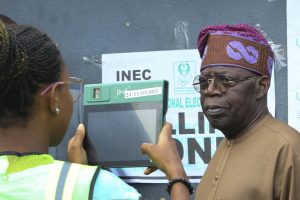
[Suggested] An official of the Independent National Electoral Commission (INEC) capturing the identification photo of Nigeria’s President Bola Ahmed Tinubu during the country’s general election. Photograph by Akintunde Akinleye / CCIJ
The report said that the commission’s social media posts in late February and mid-March generated nearly 54 million impressions on X and reached more than 1.8 million people on Facebook and Instagram.
“While the challenges of fake news, misinformation and disinformation remain, much of what would have adversely impacted the narratives around the election was mitigated by the Commission’s proactive engagement with the media underscored by its transparency, accessibility, and sincerity,” it wrote.
CCIJ submitted a detailed list of questions in a public records request to INEC about its actions and the basis for its assertions. The agency acknowledged receiving the questions but had not provided answers at the time of this publication.
CCIJ also conducted a survey through its partner newsrooms of Nigerians about election misinformation that included a question about whether respondents were aware of INEC’s advertisements and whether they were effective. Many said they were not aware of INEC’s efforts.
Idayat of CSIS acknowledged the commission’s attempts to provide accurate information and counter false claims but added that the “sheer volume and speed at which disinformation spread” made it difficult to keep pace.
“Combating disinformation requires a multi-faceted approach involving legal, technological and educational strategies to protect the integrity of elections and democracy in Nigeria,” Idayat said, advocating for a stronger legal framework with more rapid response time and stiffer penalties that can deter such behaviour.
Ordinary citizens who use social media may be a key part of that multi-pronged approach.
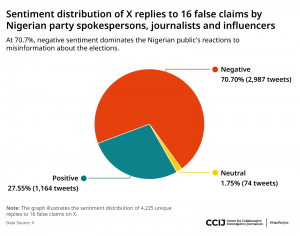
Title: Sentiment distribution of X replies to 16 false claims by Nigerian party spokespersons, journalists and influencers
Subtitle: At 70.7%, negative sentiment dominates the Nigerian public’s reactions to misinformation about the elections.
Note: The graph illustrates the sentiment distribution of 4,225 unique replies to 16 false claims on X.
Credit/Source: Data Source: X
CCIJ looked at a portion of the replies to 16 false claims party spokespersons, journalists and influencers posted on X. In every case, more than half of the replies criticised the false information. This included Fani-Koyode’s tweet about the fictitious coup plot. More than 80% of the 221 replies to that tweet were negative, according to CCIJ’s analysis.
“APC is in power, and so in charge of the Nigerian army,” businessman Somto Onuchukwu tweeted in response to Fani-Kayode and Abubakar, stamping the words “FAKE NEWS” in red letters over a picture of Fani-Kayode’s tweet. “Instead of accepting defeat, they’re busy looking for meetings that never happened.”
This story by Arinze Chijioke, Shehu Olayinka and Sodeeq Atanda was produced with the support of MuckRock and the Filecoin Foundation for the Decentralised Web.
Read more: Hamas Rejects Key Aspects Of Gaza Ceasefire Plan Proposed By U.S., Israel Says
About The Author
Related Articles
Three Doctors Suspended as Medical Council Probes Death of Chimamanda Adichie’s Son
Nigeria’s medical regulatory authority has taken the rare and serious step of...
ByWest Africa WeeklyMarch 4, 2026Night Gunfire Near Presidential Palace Sparks Tension in Ouagadougou
Gunshots were heard late on the night of February 28 into March...
ByWest Africa WeeklyMarch 3, 2026Uganda to Start Domestic Gold Purchasing Programme to Boost Reserves
Uganda’s central bank has announced plans to launch a domestic gold buying...
ByWest Africa WeeklyMarch 3, 2026Ghana’s Cedi Expected to End 2026 Around GH¢12.85 to the Dollar
The Ghanaian cedi is projected to hold relatively steady against the United...
ByWest Africa WeeklyMarch 3, 2026


